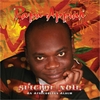On the 22nd of December, Papa Appiah’s Africoblues album, Suicide Note, was released in all major on-line download sites including CD Baby, Amazon and ITunes. Finally, Papa could sit down and rest after years of struggling to get this album out. In his desire not to take any short cuts, he employed the very best musicians Ghana could boast of and a few top class international musicians to play on this album. The list goes on forever; Grammy Award-winning trumpeter Terry Townson, Kwame Yeboah, Kari Bannerman, Nana Tsiboe, to mention but a few.
But it had not all been smooth sailing. Papa had had to battle against serious financial constraints to finally get this project completed. And when all the instrumental was done, he sought counsel from well-respected Ghanaian musical sources as to the way forward. You see, Papa had done all the recording in a plush little studio in Leicester called the Deadline Studio, whose owner, Adam Ellis, was a genius Sound Engineer. For the final vocals and mixing, however, he thought he had to go a notch up.
Following, rather blindly, the advise from the musical source, which he after all respected, he made the two and a half hour journey to London, to meet the gentleman who had been so strongly recommended to save the project. And he was a wonderful personality; very courteous and polite. But the first question Papa asked him was whether he had done any stuff for the musician who recommended him.
“No” he said, quite truthfully “but I’ve mixed for some people, and some have actually been released”
Oh Christ! The guy was honest, but Papa did not know whether to laugh or to cry. Worse was to follow, for they finally arrived at his “studio”. You see, he had met the gentleman in an area of the Canary Wharf near the river Thames, with a number of top class studios. Papa was soon to realize that the big studios had actually placed some “ship containers” in a spare plot of land, which they lent out to people to do some business by the side. And it was in one of these containers Papa was going to do his singing and mixing. He had been led from his posh little studio in Leicester to come and sing in a “ship container”. And still, he decided to give this individual a chance, based on the source of his recommendation.
It was going to get even more interesting. There was virtually no soundproofing at all. To counteract that, the gentleman had secured a microphone that blocked noise from the side.
First instruction: You have to keep your head still. No left and right movement. And keep your head the same distance from the mic at all times.
So basically, Papa had to stand like a statue all throughout his singing. Fair enough. He did his best to abide by the rules but tapped his right foot to the rhythm as he sang.
Second instruction: No no no Papa! Don’t tap your foot. The sound registers in the mic.
Unfortunately for the gentleman, the “studio” was in an air flight path. So every now and again, there would be another instruction.
Third instruction: I’ve got to stop you Papa. Let the plane pass first.
Fourth instruction: This bird. Goodness me. Sorry Papa, you’ve got to start from the top.
But what finally served as the straw that broke the camel’s back was when he edited a bum note with some monodyne software, something Adam regularly did without making a fuss, and seemed so pleased with himself, that he turned to a rather bemused Papa and gave him the high five.
‘This is no witchcraft, Papa” he said, laughing.
Papa had no choice but to boot out a rather pleasant gentleman and pack his bags back to Leicester and to Adam Ellis’ little studio. But the question he is grappling with is why anybody with any knowledge of music, would lead him to a guy like that.
Lesson number One: Papa, never trust anyone in the music business!
www.ghanansemsem.blogspot.com



